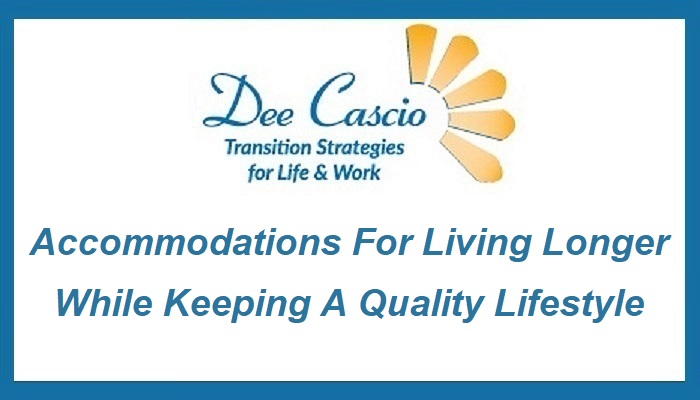Do you need to make accommodations for living longer while keeping a quality lifestyle? This may be for a parent, a spouse/partner, or even yourself. Here are some options to consider if you have the luxury of planning ahead in this situation:
1. First and foremost, make sure you communicate with each person involved about all of your thoughts, feelings, concerns, needs, worries, and desires. This is crucial when medical circumstances are involved. This is important regardless of whether you are the caregiver or the one needing medical care or other accommodations to maintain a quality lifestyle. Thoughtful lifestyle changes can be much more effective after having had open communication and cooperation.
Read more about “How to discuss downsizing with aging parents” and “Caring for aging parents: housing” on my blog.
2. Keep in mind the possibility that you might need easy access to necessary medical care, hospitals, and specialists. You may ultimately need to relocate so you can be closer to quality care or have the transportation flexibility to get to good care quickly. This may also affect how close or how far away you are from family and friends.
3. Home adaptations for special medical issues may need to be implemented. Take a few minutes to look around your house and consider your options. Here are some ideas to consider if you plan to stay in your current home:
• Move the master bedroom (for you or your spouse) or the guest room (for an elderly family member) to the main level of your home
• Lower counters for better accessibility
• Renovate bathrooms for safety and better accessibility
• Hire a professional to install a wheelchair ramp and/or a stair lift
On the other hand, if you are considering moving and possibly downsizing:
• Move to a home with at least one bedroom and full bathroom on the main level
• If your choices are equal, opt for a home that is all on one level or one with an elevator
• Don’t underestimate the importance of proximity to family, friends, shopping, and future medical services
4. Some people’s medical disabilities are affected by the climate in which they live. Moving might alleviate or minimize a medical condition. Temperature, air quality, and humidity levels can all be factors that affect one’s medical condition and quality of life.
5. Retirement dates can also be affected by one’s medical condition or the condition of a loved one. Personal health issues can often force an early retirement. For the caregiver, it can also mean either early retirement or the need to actually postpone retirement in order to work to pay for medical bills and receive health insurance benefits. These are good reasons to consider investing in long-term health care insurance to support you through the unexpected.
6. Look for an environment where you or your loved one can walk to places if the disability allows for that.
7. The Village Concept includes multigenerational living. These communities allow older residents to age in place. The younger residents support the older residents with socialization and transportation; the older residents help the younger residents with children or during illness. Some of these villages require a small fee to participate.
Talk these accommodations for living longer and keeping a quality lifestyle over with those who will be affected. Planning ahead—discussing needs, hopes and dreams, possible scenarios, and first choices—is best. If you are in a medical crisis, seek the knowledge and support of medical personal and social services to make these adjustments as quickly and effectively as possible.
